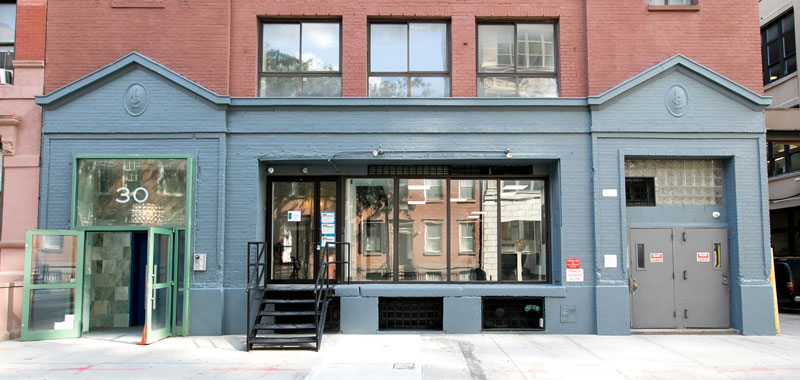With a background in the early-stage, restaurant-delivery scene, as well as raw memories of his parents losing everything after a career in restaurant ownership, Zuul Kitchens Co-founder and CEO Corey Manicone says ghost kitchens are the logical way forward for an industry that was never designed for the intense demands of delivery and off-premises dining in general.
His company’s first ghost kitchen recently opened in Manhattan and, with industry darling Sweetgreen as one of its first tenants and massive investments flowing into some of his best-known competitors, Manicone sees this fast-growing restaurant industry sub-category exploding.
Reflecting on his college days when he swore off the restaurant industry following his parents’ bad experience in the business, he said he nevertheless was hired as Relay delivery’s first employee. Glad to have the job, he and the delivery provider’s team completed approximately 50 deliveries on that first day just four years ago.
His experience at Relay opened his eyes to the challenges of restaurants trying to adapt to delivery, and helped him develop what he calls the optimal delivery playbook that includes geofencing and route efficiency, among other best practices.
“I got to know damn near every fast-casual and QSR player in New York City, and really began to learn how big this behavioral shift toward [off-premises] dining really was, and primarily delivery,” he said. “If you take a step back and look at the historical restaurant infrastructure, it was never built with the intent of supporting [off-premises] dining, which is why all these operators are being incredibly reactive.”
Years later, some of those early-days restaurant partners have seen delivery and catering grow to more than 50 percent of their total revenue, and his new ghost kitchen brand Zuul is primed to bring other restaurant brands along for the ride.
Located at 30 Vandam Street in the SoHo neighborhood of Lower Manhattan, Zuul opened for business one month ago with Sweetgreen, one of the hottest brands in the East Coast restaurant scene. Other first-wave tenants include Naya, Sarge’s Delicatessen, Junzi and Stone Bridge Pizza & Salad. The facility was built with nine kitchen bays between 184 and 265 square feet, but multiple clients signed up for double spaces. Zuul SoHo expects to fill its final spaces and be fully occupied by the end of October.
Manicone declined to share pricing details, but said tenants pay a monthly membership fee that includes hood cleaning, pest control, phone, internet, trash and other loose ends in an effort to make the process as easy as possible for restaurant partners.
Zuul began by offering one-year memberships, but said early tenants asked for longer agreements, so the company is considering going with terms that are “a little longer than a year.” Manicone added those agreements are a far cry from the 10- to 15-year leases, which are common in the restaurant business.
Additional tenant amenities include four points of egress, a lounge with drinks and chargers for hard-working drivers, an employee break room, secure dry storage, dual wash bays and a 30-foot walk-in cooler, among others.
“We are a true partner for these operators, so whether it’s cleaning their equipment or helping fulfill the orders and acting as the liaison between our brands and the couriers, our core mission statement is to truly be their operational partner and take some of this historical challenges my father faced off their plate,” Manicone said. “And so far, so good.”
Describing the layout of the first location, Manicone said the basic idea is flipping the traditional restaurant layout where the bulk of space is dedicated to front-of-the-house operations, with the kitchen and storage crammed in the back.
“We effectively flipped that on its head,” he added. “That 20 percent [for dispatching deliveries] was very thoughtfully designed to make sure we’ve got operational efficiency from a dispatch center standpoint.”
Without sharing his entire playbook for future locations, Zuul—which is named for an inter-planar being that possessed actor Sigourney Weaver’s character in Ghostbusters—is planning to expand to five locations within the New York metro. Even as competitive ghost kitchen brands like Kitchen United and CloudKitchens scale up, Manicone said the prospect of direct competition in the city isn’t anything his team fears.
“If Kitchen Untied opens in FiDi, that doesn’t mean they even own the FiDi neighborhood, right?” he said. “There are 18,000 restaurants in this town, so ensuring that brands are successful and they have the support, the more of us in the market that are able to provide that support, candidly, the better.”
On the hunt for future tenants, Manicone said members of his 20-person team are talking to “every single large player nationally and locally here” to prepare the lineup for the brand’s upcoming locations. He claims that his employees have a background in the restaurant brand, so analyzing a P&L statement or ironing out operational kinks is a point of differentiation Zuul will highlight as the delivery-only kitchen scene expands in the coming years.
“It’s crazy to think this [delivery] market is still in its infancy, however, consumers are showing no signs of slowing and that convenience is top of mind,” he said. “You can’t watch TV now without seeing a Taco Bell-Grubhub ad, so I think it’s really just begun, and I think this [New York] market is going to set the tone for the rest of the United States, as well.”


